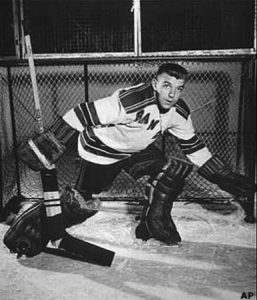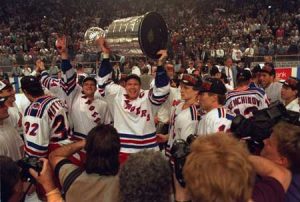Game 6: My most exciting two minutes in sports
Montreal Canadiens vs. New York Rangers
Madison Square Garden, New York City
ca. winter, 195?
[Note: this is the one game for which I cannot pinpoint a date. I had always assumed in memory that it came in the 57-58 season, but I could not find in the Rangers’ game log, one that matched, except one where Marcel Paille was the goalie. It may have been the following season then, but I could not verify a precise date. I was there, Worsley was the goalie, and what I describe is what I saw, but that is all I know].
Hockey was the last of the major sports I would become a fan of, an enthusiasm I would acquire from a childhood friend who had taken up the sport and would go on to become a first-rate goalie for our high school team. My friend built a make-shift goal out of scrap lumber and netting, and it became a routine for the two of us after school to play in the street—he would tend goal and I would shoot wrist shots at him—attenuated practice when there was no ice available. He was a Rangers fan and his favorite player was fellow-goalie, Gump Worsley. I, too, adopted both the team and Worsley as my favorites.
The Rangers were an average team at best; Worsley, Harry Howell, and Andy Bathgate were its best players, and they were no match for the Detroit Red Wings (the dominant team of the early 50s) and the new dynasty of the Montreal Canadiens. Still we were devoted fans of the Rangers, despite their mediocrity, and Bill taught me many of the subtleties of the game, often in a sarcastic manner at various Ranger players’ inability to execute said subtleties.
In the fall of my sophomore year in high school, m friend said that the Rangers were selling cheap tickets to a Saturday matinee at Madison Square Garden (the previous edition on Eighth Avenue between 49th and 50th Streets) against the Boston Bruins, and did I want to go? Of course, I replied. And for the second time, I was disappointed because my favorite player did not play. Gump was a scratch because of an injury, and instead we got to see the NHL debut of Marcel Paille, who shutout the Bruins. Luckily, this was merely a prologue.
Our next time at the Garden was when my friend’s dad got a block of tickets for a night game against the hated and almost invincible Canadiens of Beliveau, Plante, Moore, Harvey, Geoffrion and the Richard brothers. Bill’s dad drove us to the Garden, which was packed and hazy with cigarette smoke, and we ascended to the nosebleed seats on the upper level behind the 50th Street goal.

Early in the first period, things looked predictably grim for the Rangers. A penalty led to a power play opportunity for the Canadiens, and then, less than a minute later, the Rangers were penalized again, making the Rangers two men short. It was then that Gump Worsley provided me with the most excitement I have ever experienced at a sporting event. The Rangers were not able to clear the puck out of their end the entire time, and Worsley made easily a dozen and a half saves in the next two minutes, some of them seemingly impossible—blinding slap shots in which he was screened—and the crowd just roared at every one, and when the penalties were finally killed, the Garden erupted in applause. Emboldened by Worsley’s phenomenal feat, the Rangers went on to win the game–one of the bright moments in another so-so season.
After that, I revered Gump. First, he seemed approachable because he looked so ordinary and not at all “athletic” especially by today’s bulked-up standards—a fireplug with a crew cut. Then I discovered he was inordinately fond of beer (an enthusiasm I would soon discover myself) making him even more like an average guy. And he was funny: in an interview with a New York sports reporter, he was asked which team gave him the most trouble. “The Rangers,” Gump deadpanned.
Luckily for Gump’s health and fortune, he was traded a few years later to a good team, the archenemy Canadiens, where he finally got to play on a Stanley Cup winning team. In 1980, he was inducted into the Hockey Hall of Fame.
But being a Rangers fan was not such a lucky fate. For almost a decade, they fielded a very fine team (the Ratelle-Gilbert-Hadfield line, Brad Park, Eddie Giacomin, etc.) that always came up short in the playoffs. Only the 71-72 and 78-79 teams made it to the finals, and the efforts of Worsley’s fine successors—Giacomin, John Davidson, John Vanbiesbrouck, all came to naught.
I was only a part-time hockey fan by the 93-94 season. I ignored the regular season, and only watched the Stanley Cup playoffs when there were just four teams left. I was very surprised that the Rangers were one of the four—they hadn’t won the Cup since the year before I was born, and I had years earlier concluded it was something I would never see.

Hockey is a low-scoring, very intense game, and at times it was excruciating to watch the games—three double overtime games against the Devils in the Eastern Conference finals alone practically sent me to the ER, including game seven. After a loss to the Devils in game five, it looked like the end of another disappointing Ranger season, but Ranger captain Mark Messier, perhaps channeling Joe Namath, guaranteed they would win on the road in Jersey and play a game seven in the Garden, and he, with three goals in the third period, made good on his promise. In game seven, I had to turn the TV off —I couldn’t take it, and was sure I would jinx the Rangers by watching. I turned it back on just in time to see Stephan Matteau’s winning goal in the second overtime. I had even worse jitters in the finals against the Canucks, again a seven game series. During game seven, I frequently had to walk away from the TV, paced the floor in my hallway, cursing myself for having given up smoking six years earlier. My heart sank when twice the Rangers had their two-goal lead reduced to one. When a bouncing puck just clanged off the goal post near the end of the game, I thought I was going to pass out. But the Rangers held on to win to become the last pro team I rooted for in my years of sports fandom to win a championship. Later, sipping a cup of coffee (I had quit drinking years earlier), tamping down my desire for a cigarette to go with the coffee, I thought of my childhood friend, whom I had not seen in 30 years, and wondered if he was still a fan, if he was as overjoyed as I was. The Rangers victory was the unexpected icing on the cake of my life as a sports fan.
The following day, in one of the New York papers, there was a typical roundup story about the joy of “long suffering” Rangers fans. One anecdote caught my eye: before he went to the Garden for the game, a Rangers fan went to his father’s grave, and placed a transistor radio tuned to the station that broadcast the game on the tombstone. I understood completely.